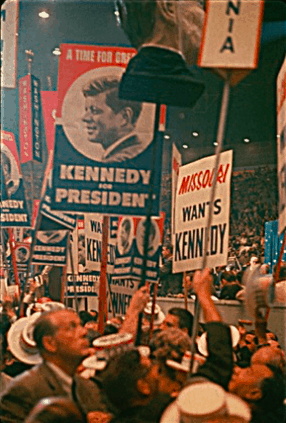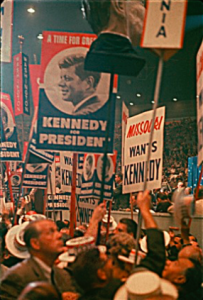When I was a child, my mother came into my bedroom one summer night and gently shook me awake. In the moonlight creeping through the Venetian blinds, I saw her finger across her lips in that universal symbol of silence. She took my hand and guided me into the living room while my father, brother and sister slept.
In the dark living room, the glow of the black-and-white television had an ethereal aura. “You have to see this,” she whispered. “It’s the convention, and John Kennedy’s going to be nominated.”
We watched while the last few states polled their delegates and announced their votes, in the middle of the night, after the television set had usually gone dark. I was never sure why she woke me, and no one else in the house.
I knew why it mattered to her. She was raised in Massachusetts, as was Kennedy, with an accent so strong her children teased her about it until she left us. She was by then a Catholic living in the state of Mississippi where Catholics (perhaps because of Klan activities through the years?) were only 2% of the population. And a Catholic had never been President, an issue that surfaced during the campaign as a potential problem.
His win was of more than the usual historic importance when a presidential candidate is nominated. As is Hillary Clinton’s this week, the first woman nominated by a major political party.
I recalled that moment during this week’s Democratic Convention. I remembered waiting to learn the final count of votes from each state in conventions of years ago, to learn who would be the candidate. I remembered the roll call where a state’s representative might say something like, “We are proud to hail from the State of. . .the largest producer of. . .in the world” then list all the state’s positive attributes. “We cast this many votes for Candidate A, this many votes for our native son (rarely a native daughter), and this many votes for the next President of the United States of America. . .” Drama to the end, drama carried by the networks in prime time—and beyond.
Then I began to wonder if this is part of what has helped to weaken our democracy. I thought of all the people for whom conventions used to mean something important about our country, before the results were so assured that the convention became only a dramatic production by the political party. We have lost part of the democratic process and are left with only the hype. Prime time coverage, for most networks, is only one hour, so we see only the highest drama, drama that is staged as entertainment. There is no genuine drama, no horsetrading, no feeling of participation by the viewer.
I wondered what it might be like to have once again the tension of wondering if there were enough votes for our favored candidate. Would we be more interested in the democratic process? Would we watch with baited breath to learn the outcome? And would the news organizations carry the voting in prime time? If that were the case, perhaps more citizens would vote, and perhaps the conventions would stop being massive marketing events for the winner (even before the convention votes are cast). Perhaps they would return to being exercises of citizenship and perhaps our large color television sets would illuminate our living rooms with democracy.


